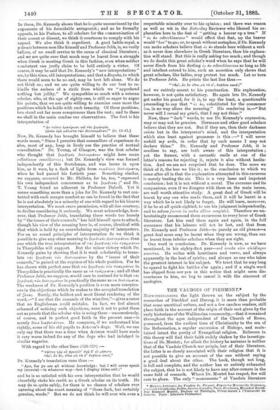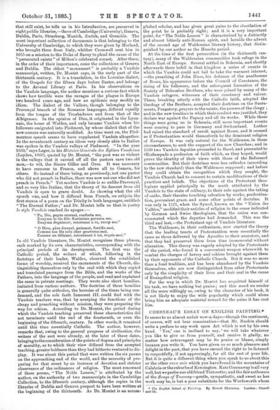THE VAUDOIS OF PIEDMONT.*
NOTWITHSTANDING the light thrown on the subject by the researches of Dieckhof and Herzog, it is more than probable that some uncritical writers, and not a few careless readers, still place faith in the account of the origin of their sect given by the early historians of the Waldensian community,—that it remained throughout the ages independent of the Church of Rome, possessed, from the earliest time of Christianity to the era of the Reformation, a regular succession of Bishops, and main- tained intact the purity of Evangelical religion. Believers in this theory will find their faith rudely shaken by the investiga- tions of Dr. Montet; for albeit the history he narrates is neither that of the Vaudois Church nor people, but of their literature, the latter is so closely associated with their religion that it is not possible to give an account of the one without saying a good deal about the other. The book, though not long, is full and complete, and the author has so entirely exhausted the subject, that he is not likely to have any after-comers in the same field of research. Where Dr. Montet has reaped, few will care to glean. The only " monuments " of Vaudois literature • Histoire Littgraire des Vaudois du Pie,nont. d'apres les Manuserits Originaux, c.m.e rods d Cambridge, Dublin, Gender, Grenoble, Paris, Strasbourg, Munich it Zurich. Par Edouard Montet, Doutear en Thdologia, Privat-docent h l'Univenite de Geneve. Paris : Librairie Fishbacher.
that still exist, he tells no in his Introduction, are preserved in eight public libraries,—those of Cambridge (University), Geneva,
Dublin, Paris, Strasburg, Munich, Zurich, and Grenoble. The most important collection of documents is that belonging to the University of Cambridge, to which they were given by orland, who brought them from Italy, whither Cromwell sent him in
1655 on a mission to the Duke of Savoy to plead the cause of the persecuted saints" of Milton's celebrated sonnet. After these, in the order of their importance, come the collections of Geneva and Dublin. The oldest "monument" is probably a Vaudois manuscript, written, Dr. Montet says, in the early part of the thirteenth century. It is a translation, in the Lorraine dialect, of the Gospels for the fifteen days before Easter, and belongs to the Arsenal Library at Paris. In his observations on the Vaudois language, the author mentions a curious fact which shows how terrible were the ravages of the plague in Europe two hundred years ago, and how an epidemic may modify an idiom. The dialect of the Valleys, though belonging to the Provencal branch of the Romance languages, differed equally from the tongue of the Troubadours and from that of the Albigenses. In the opinion of Diez, it originated in the Lyon- nais, the home of Waldez, and only became Vaudois when his followers emigrated into Piedmont, by whose dialect that of the new-comers was naturally modified. As time went on, the Pied- montese speech seems to have supplanted Vaudois altogether. In the seventeenth century an idiom very closely akin to Italian was spoken in the Vaudois valleys of Piedmont. "In the year 1630," says Leger, in his Histoire Generale des Eglises Vaudoises (Leyden, 1669), quoted by Dr. Montet, "the pest was so violent in the valleys that it carried off all the pastors save two old men,—to wit, the Sieurs Gilles and Gros. It was necessary to have recourse to France, and above all to Geneva, for others. So instead of there being, as previously, not one pastor who did not preach in Italian, there was now not one who did not preach in French." Yet modern Vaudois is so unlike Provencal, and so very like Italian, that the theory of its descent from old Vaudois is open to grave doubt. As showing what the old speech was, and how it differed from French, we subjoin the first stanza of a poem on the Trinity in both languages, entitled, "The Eternal Father ;" and Dr. Montet tells us that in poetry is style Vaudois reached its apogee :—
" Po, Dio, payre eternal, conforta me, Enayma lo tio Silo Raxissime governs me.
Enayma degainant, retornant a tu, recep me."
"0 Dieu, pare 6ternel, puissant, fortifie-moi, Comme ton fils tres char gonverne-moi.
Comma rm delaisse, retournant toi, recois-moi."
In old Vaudois literature, Dr. Montet recognises three phases, each marked by its own characteristics, corresponding with the principal periods of its development. The first was the Catholic period, the writers of which, following in the footsteps of their leader, Waldez, observed the established forms of worship, received the sacraments of the Church, dis- tinguishing themselves only by the zeal with which they copied and translated passages from the Bible, and the works of the Fathers, into the language of the people, and read and explained the same in private meetings. They wrote also short homilies, imitated from various authors. The doctrine of these homilies is generally quite orthodox, the heresies of the times being con- demned, and the sole fault Innocent III. could find with the Vaudois teachers was, that by usurping the functions of the clergy and preaching without mission, they were preparing the way for schism. According to Dr. Montet, the period during which the Vaudois teaching preserved these characteristics did not terminate until the end of the fourteenth, or even the beginning of the fifteenth, century. In other words, it remained until this time essentially Catholic. The author, however, remarks that, owing to the general progress of civilisation, the writers of the sect were already, at the later of these dates, bringingto the consideration of the points of dogma and principles of morality, as to which their view differed from the accepted teaching, greater boldness than they had hitherto ventured to dis-
play. It was about this period that were written the six poems on the approaching end of the world, and the necessity of pre- paring for that event by an increase of devotion and stricter observance of the ordinances of religion. The most renowned of these poems, "The Noble Lesson," is attributed by the author, on the authority of two manuscripts in the Cambridge Collection, to the fifteenth century, although the copies in the libraries of Dublin and Geneva purport to have been written at
the beginning of the thirteenth. As Dr. Montet is an accom-
plished scholar, and has given great pains to the elucidation of the point he is probably right ; and it is a very important point, for "The Noble Lesson" is characterised by a distinctly and almost bitterly anti-Roman spirit, and heralds the advent of the second age of Waldensian literary history, that distin- guished by our author as the Hussite period.
At the time of the first persecution (in the thirteenth cen- tury), many of the Waldensian communities took refuge in the North-East of Europe. Several settled in Bohemia, and shortly afterwards there befell in that kingdom a series of events in which the Vaudois could not fail to take the warmest interest, —the preaching of John Huss, his defiance of the anathemas of Rome, his appearance before the Council of Constance, the rising of his followers, and the subsequent formation of the Society of Bohemian Brothers, who were joined by many of the Vaudois refugees, witnesses of their constancy and valour. These, breaking utterly with the Catholic faith, adopted the theology of the Brothers, accepted their doctrines on the Sacra- ments, Purgatory, prayers to the saints, the powers of the clergy ; and in the new treatises in which their conduct was justified, they declare war against the Papacy and all its works. While these things were going on in Bohemia, still more important events were coming to pass in Germany and Switzerland. Luther had raised the standard of revolt against Rome, and it seemed as if Protestantism would thenceforth be the dominant religion of Europe. It was only natural for the Waldenses, in these circumstances, to seek the support of the new Churches ; and in 1530 two Vaudois deputies proceeded to Basel, and presented to CEcolampade a profession of faith which, as they hoped, would prove the identity of their views with those of the Reformed communities. But their doctrines were less orthodox (according to the new standard) than the Waldenses supposed ; and before they could obtain the recognition which they sought, the Vaudois Church had to consent to certain modifications of their practices and beliefs. The objections of the Protestant theo- logians applied principally to the merit attributed by the Vaudois to the state of celibacy, to their rule against the taking of oaths, their theories touching salvation by works, predestina- tion, prevenient grace, and some other points of doctrine. It was only in 1571, when the Synod, known as the "Union des Vallees," modified their articles of religion in the sense indicated by German and Swiss theologians, that the union was con- summated which the deputies had demanded. This was the third and last,—the Protestant age of Vaudois literature.
The Waldenses, in their enthusiasm, now started the theory that the leading tenets of Protestantism were essentially the same as those delivered by the Apostles to their ancestors, and that they had preserved them from time immemorial without alteration. This theory was eagerly adopted by the Protestants of the period, who found it a convenient weapon wherewith to combat the charges of heresy and schism brought against them by their opponents of the Catholic Church. But it was no more than a fond tradition, and has been abandoned by the Vaudois themselves, who are now distinguished from other Protestants only by the simplicity of their lives and their zeal in the cause of Evangelical religion.
For the way in which Dr. Moniet has acquitted himself of his task, we have nothing but praise ; and this meed we render
all the more willingly as, owing to the character of his book, it is not likely to enjoy the wide popularity which could alone bring him an adequate material reward for the pains it has cost him.







































 Previous page
Previous page